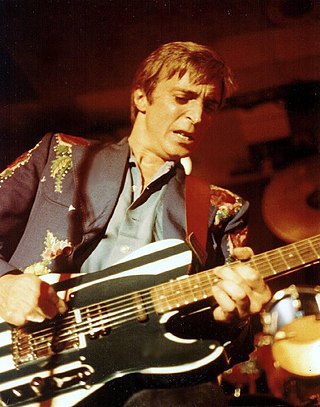
Michael Ronson was an English musician, songwriter, arranger, and producer. He achieved critical and commercial success working with David Bowie as the guitarist of the Spiders from Mars. He was a session musician who recorded five studio albums with Bowie followed by four with Ian Hunter, and also worked as a sideman in touring bands with Van Morrison and Bob Dylan. A classically trained musician, Ronson was known for his melodic approach to guitar playing.

David Bowie is the second studio album by the English musician David Bowie, originally released in the United Kingdom on 14 November 1969 through Mercury affiliate Philips Records. Financed by Mercury on the strength of "Space Oddity", the album was recorded from June to October 1969 at Trident Studios in London. Gus Dudgeon produced "Space Oddity", while Tony Visconti produced the rest of the album. It featured an array of collaborators, including Herbie Flowers, Rick Wakeman, Terry Cox and the band Junior's Eyes.

Anthony Edward Visconti is an American record producer, musician and singer. Since the late 1960s, he has worked with an array of performers. His first hit single was T. Rex's "Ride a White Swan" in 1970, the first of many hits in collaboration with Marc Bolan. Visconti's lengthiest involvement was with David Bowie: intermittently from the production and arrangement of Bowie's 1968 single "In the Heat of the Morning" / "London Bye Ta-Ta" to his final album Blackstar in 2016, Visconti produced and occasionally performed on many of Bowie's albums. Visconti's work on Blackstar was awarded the Grammy Award for Best Engineered Album, Non-Classical and his production of Angelique Kidjo's Djin Djin received the Grammy Award for Best Contemporary World Music Album.
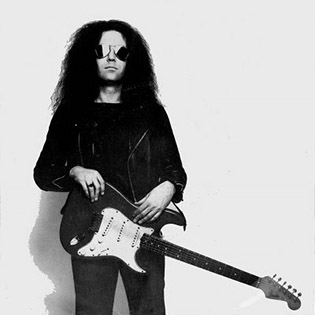
Larry Wallis was a British rock guitarist, songwriter and producer. He was best known as a member of the Pink Fairies and an early member of Motörhead.
Shagrat was a British supergroup formed by Steve Peregrin Took and Mick Farren in February 1970 after they split with Twink, their partner in the prototype Pink Fairies supergroup of late 1969. They recruited Larry Wallis and Tim Taylor (bass), both formerly of The Entire Sioux Nation. Farren left the band shortly after its establishment and never recorded or performed with them. Shagrat then became Took's band outright with Wallis, Taylor, Phil Lenoir (drums), and later Dave Bidwell (percussion).

Steve Peregrin Took was an English musician and songwriter, best known for his membership of the duo Tyrannosaurus Rex with Marc Bolan. After breaking with Bolan, he concentrated on his own singer-songwriting activities, either as a solo artist or as a frontman for several bands.
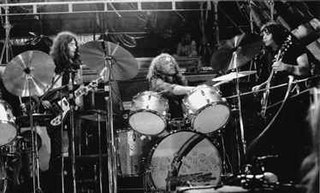
Pink Fairies are an English proto punk rock band initially active in the London underground and psychedelic scene of the early 1970s. They promoted free music, drug use, and anarchy, and often performed impromptu gigs and other stunts, such as playing for nothing outside the gates at the Bath and Isle of Wight pop festivals in 1970, as well as appearing at Phun City, the first Glastonbury and many other free festivals including Windsor and Trentishoe.
John Charles Edward Alder, also known as Twink, is an English drummer, actor, singer, and songwriter who was a central figure in the English psychedelic and proto-punk movement.

The Deviants were a British psychedelic rock band originally active from late 1966 to 1969, but later used as a vehicle for the musical work of writer Mick Farren until his death in 2013.
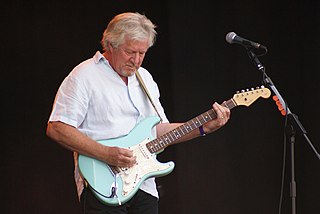
Timothy John Pearson Renwick is an English guitarist. He is best known for his association with Al Stewart in his early career and for his long-standing role as lead guitarist for the Sutherland Brothers & Quiver. His single "Dark Island" peaked at number 80 in Australia in 1980.
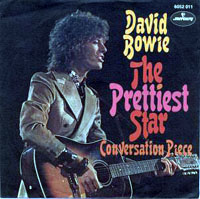
"The Prettiest Star" is a song by the English musician David Bowie, originally released on 6 March 1970 through Mercury Records as the follow-up single to "Space Oddity". A love song for his soon-to-be wife Angie, it was recorded in January 1970 at Trident Studios in London and featured Marc Bolan on guitar, who was brought on by producer Tony Visconti. Despite praise from music journalists, the single flopped and failed to chart. Years later, Bowie rerecorded the track for his 1973 album Aladdin Sane. A more glam rock influenced take with lyrics matching themes on the album, Mick Ronson recreated Bolan's guitar part almost note-for-note. The remake was more well-received.
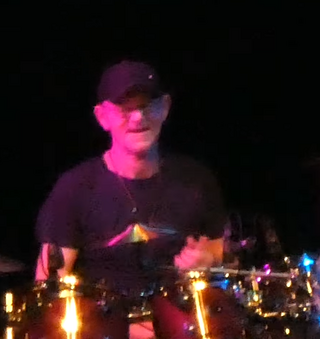
Michael "Woody" Woodmansey is an English rock drummer best known for his work in the early 1970s as a member of David Bowie's core backing ensemble that became known as the Spiders from Mars in conjunction with the release of Bowie's 1972 LP The Rise and Fall of Ziggy Stardust and the Spiders from Mars. With the death of Bowie in January 2016, Woodmansey became the last surviving member of the Spiders.
"Black Country Rock" is a song by the English musician David Bowie, released on his 1970 album The Man Who Sold the World. The song was recorded in May 1970, with sessions taking place at Trident and Advision Studios in London. The lineup featured Bowie on lead vocals, guitarist Mick Ronson, bassist/producer Tony Visconti, drummer Mick Woodmansey and Ralph Mace on Moog synthesiser. The track was mostly composed by Ronson and Visconti, who developed it using a basic song sketch from Bowie. Labelled under the working title "Black Country Rock", Bowie used the title to write the lyrics towards the end of the sessions, resulting in a repeated two-line verse and chorus. A blues rock and hard rock number, Bowie imitates T. Rex's Marc Bolan in his vocal performance.
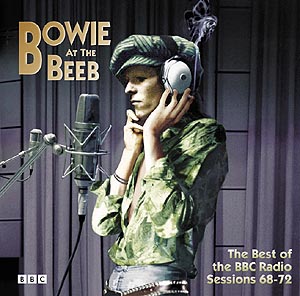
Bowie at the Beeb is a compilation album by the English singer-songwriter David Bowie, first released in 2000. Originally, it came in a three-CD set, the third, bonus CD being a live recording made on 27 June 2000 at the Portland BBC Radio Theatre, part of his Mini Tour. Later editions contain only the first two CDs.

Paul Fraser Rudolph is a Canadian guitarist, bassist, singer, and cyclist. He made his mark in the UK underground music scene, and then as a session musician, before returning to Canada to indulge his passion for cycling. He resided in Gibsons, British Columbia, where he owned and operated a bicycle business, Spin Cycle. He has since retired to Victoria, British Columbia.
The Rats were an English rock band, first established in 1963, from Hull, East Riding of Yorkshire, England.

What a Bunch of Sweeties is a 1972 album by the UK underground group Pink Fairies.

Quiver were a British rock band formed in 1970 by Tim Renwick and Cal Batchelor. In December 1972, they teamed up with the Sutherland Brothers and became known as Sutherland Brothers & Quiver, releasing soft rock music and achieving success with the songs "(I Don't Want to Love You But) You Got Me Anyway" and "Arms of Mary", a No. 5 UK hit.
Hype was a band formed by David Bowie in 1970. The band were originally titled 'The David Bowie Band' for their first gig on 22 February 1970 at the Roundhouse, London. The second Hype gig on 23 February at the Streatham Arms, London was performed under the name 'Harry the Butcher', for their third gig they were billed as 'David Bowie's New Electric Band' with the subtitle 'So New They Haven't Got A Name Yet'. They were billed to appear at the Fickle Pickle Club in Westcliff-on-Sea on Friday July 17 1970 as "Debut of David Bowie with Harry The Butcher".













